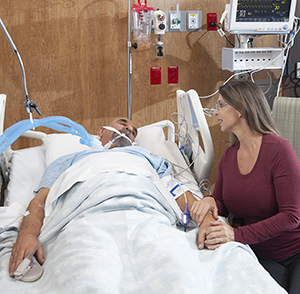After surgery for a brain aneurysm, you may spend
In the ICU
Your loved ones may visit you in the ICU (intensive care unit) . You may be attached to many devices to help with your breathing and to monitor pressure on your brain, any new bleeding, narrowing of your blood vessels (vasospasm), and general body functions. Special devices may be used to help maintain blood flow in your legs. After open surgery, your head may be bandaged. After an endovascular procedure, you will need to lie still for several hours. Once stable, you will be moved to a regular hospital room.
Evaluating the outcome
Follow-up tests may be done
As healing begins
At first, you may be on a liquid diet. As your body recovers, you can start eating solid foods. Your ability to swallow, move about, and perform other functions will be checked. You will also learn breathing exercises. These will help your body recover from surgery.
Working toward recovery
You may have trouble moving your arms or legs, talking, or understanding language. If so, you may need rehabilitation. Special therapists will work with you to help improve your balance, strength, speech, and daily living skills. A therapist may suggest equipment that can help you move about at home.
Featured in


